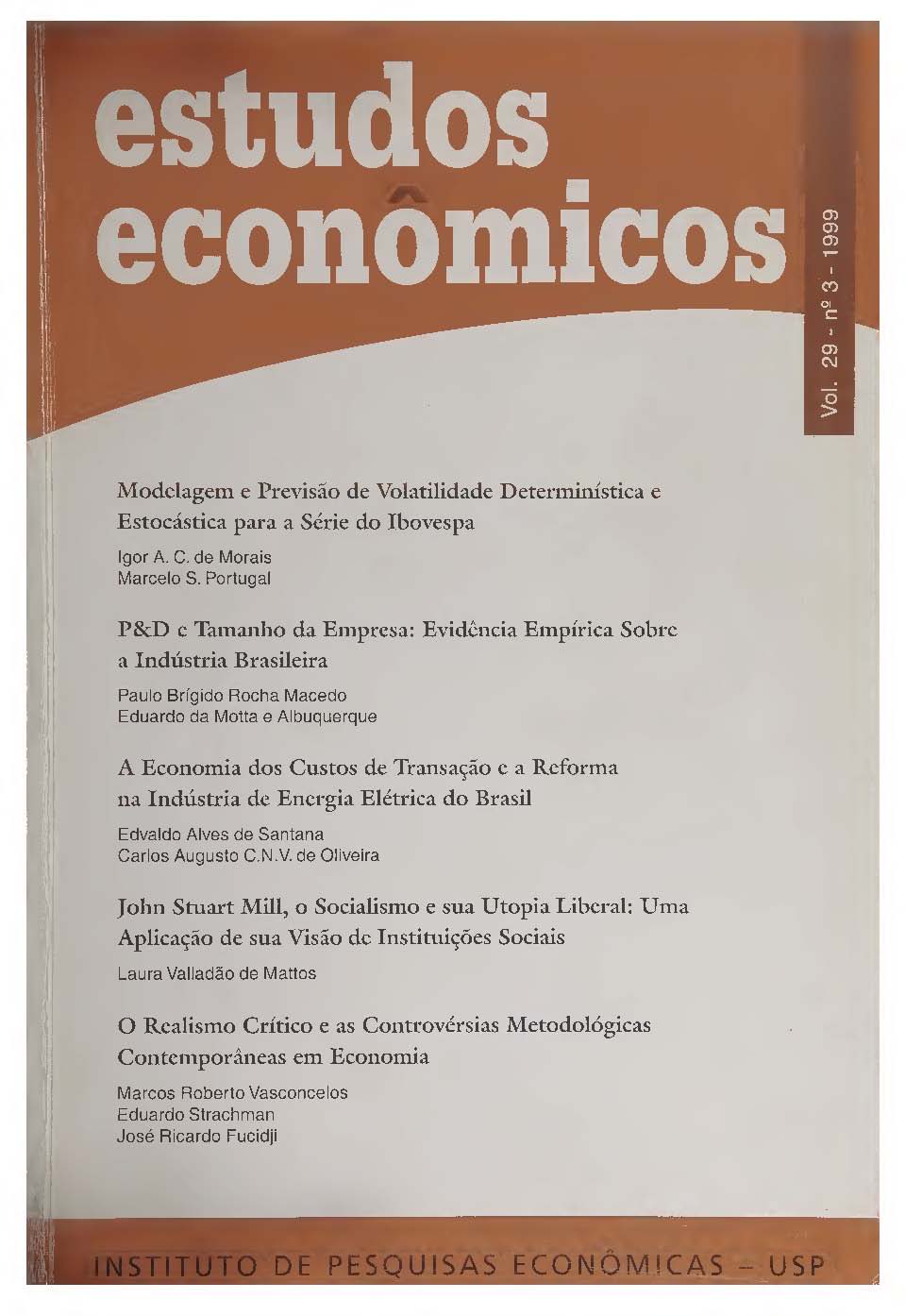John Stuart Mill, o socialismo e sua utopia liberal: uma aplicação de sua visão de instituições sociais
DOI:
https://doi.org/10.11606/1980-53572934lvmKeywords:
J.S. Mill, philosophy of institutions, socialism, liberal utopia, moral utopiaAbstract
This paper analyses Mill's rejection of socialism and his adherence to what we chose to
call his 'liberal utopia' from the viewpoint of his theory of institutions. Mill's belief was that,
to be adequate, social institutions should promote social progress - understood mainly as
individual improvement - without endangering the social order. Socialist institutions were
seen as limited in their capacity to promote some of the main features that Mill wished to
see cultivated in manking (such as creativity, uniqueness, originality, autonomy, etc.) and
this explains his rejection of this kind of social alternative. Mill's philosophy of institutions
also sheds light into the nature of his 'liberal utopia'. In fact. Mill refuses to postulate the
specific form of institutional arrangement that should prevail in an ideal society. What he
clearly indicates is that at each stage of development of society the institutions should
stimulate, to the limit, the improvement of human beings. In this sense we argue that his
social utopia is anchored in his moral utopia of perfectibility of manking.
Downloads
References
DUNCAN, G. Marx and Mill: two views on social conflict and social harmony. London: Cambridge University Press, 1973.
HARRIS, A. L. John Stuart Mill's theory of progress. Ethics an International Journal of Social,Political^ and Legal Philosophy, v. LXVI, n. 3, april 1956.
HOAG, R. W Mill's conception ofhappiness as an inclusive tnd.Journal ofthe History of Philosophy, v. XXy 1987.
MILL, J. S. (1865) August Comte and positivism. In: Collected Works ofJohn Stuart Mill (CW) v.X. Toronto: University of Toronto Press, 1969.
MILL, J. S. (1873) Autobiography. London: Penguin Books, 1989.
MILL, J. S. (1838) Bentham. In: LEAVIS, F. R. (org.), Mill on Bentham and
Coleridge. Cambridge: Cambridge University Press, 1980.
MILL, J. S. (1879) Chapters on socialism. In: CFTU Toronto: University of
Toronto Press, 1967.
MILL, J. S. (1836) Civilization. In: HIMMELFARB, Gertrude (ed.), Essays on
politics and culture. Gloucester: Peter Smith, 1973.
MILL, J. S. (1840) Coleridge. Jw; CWX. Toronto: University ofToronto Press, 1969.
MILL, J. S. (1861) Considerations on representativegovernment. New York: The Liberal Arts Press, 1958.
MILL, J. S. (1874a) Nature. In: CWX. Toronto: University of Toronto Press, 1969.
MILL, J. S. (1848) Principles ofpolitical economy with some oftheir applications to social philosophy. In: CWU e III. Toronto: University of Toronto Press, 1965.
MILL, J. S. (1834) Remarks on Bentham's philosophy. In: CWX. Toronto; University of Toronto Press, 1969.
MILL, J. S. The earlier letters of John Stuart Mill (1812-1848). In: CWXIII. Toronto: University of Toronto Press, 1963.
MILL, J. S. (1874b) The utility of religion. In: CWX. Toronto; University of Toronto Press, 1969.
MATTOS, L. A natureza humana e o 'homem economico' milliano. Estudos
Econômicos, v. 27, n. 1, p. 69-96, jan./abr. 1997.
MATTOS, L. Economia política e mudança social. Sao Paulo: EDUSP, 1998.
MUELLER, I.John Stuart Mill and french thought. University of Illinois Press, Urbana,1956.
ROBBINS, L. The classical economists and socialism: J. S. Mill. In: The theory
of economic policy. London; MacMillan, 1952.
SCHWARTZ, P. La nueva economiapolitica deJohn StuartMill. Madrid; Tecnos, 1968.
SCHWEINITZ JR., K. J. S. Mill and India. Research in the history ofeconomic thought and methodology, v. 2. Londres: J. A. 1. Press, 1984.
Downloads
Published
Issue
Section
License
Copyright (c) 1999 Laura Valladão de Mattos

This work is licensed under a Creative Commons Attribution-NonCommercial 4.0 International License.
By submitting an article, the author authorizes its publication and attests that it has not been submitted to any other journal. The original article is considered final. Articles selected for publication are proofread for grammatical and orthographic errors. The journal does not pay rights for published articles. The Institute of Economic Research from the School of Economics, Business and Accounting of the University of São Paulo (Instituto de Pesquisas Econômicas da Faculdade de Economia, Administração e Contabilidade da Universidade de São Paulo) owns the journal's copyright.




